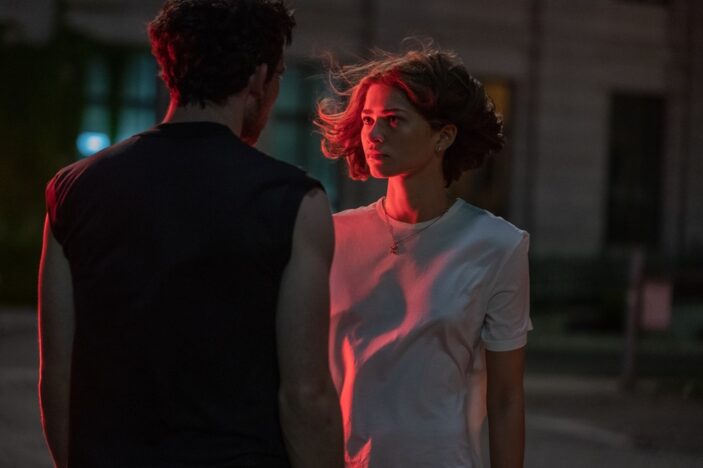
Going into Challengers, I think it needs reiterating for unsuspecting audiences that, as much as this is being advertised as “a sexy tennis movie” (which it absolutely is), it’s a Luca Guadagnino feature. So don’t be at all surprised that the director of the lush and tragic Call Me By Your Name, the oft-unnerving Suspiria remake, and the confronting cannibalistic romance Bones and All delivers the type of material that could have viewers clutching metaphorical pearls whenever undeniable It Girl Zendaya utters a line of brilliant causticity or male co-leads Mike Faist and Josh O’Connor dabble in acts of homoeroticism.
In the same manner that Guadagnino utilised the sexual nature of peaches and anthropophagy, respectively, in Call Me By Your Name and Bones and All, tennis is used here as a carnal metaphor. It’s an undeniably sexy film about a trio of lurid people, but the sexual content itself is far more suggestive and less graphic than expected, with the director opting to truly highlight the words of Justin Kuritzkes‘ script in the raw manner in which they were intended.
Three young tennis players are at the centre of Challengers, with each relationship formed with the other, and then wholly together, driving the various time stamps the film jumps about with over the course of its 131 minutes. Arguably the most important lies between that of Art Donaldson (Faist) and Patrick Zweig (O’Connor), two tennis bros, who quite lovingly adore playing with each other on – and off – the court. Their individual personalities prove miles apart – Art is the more clean-cut of the two, Patrick exemplifies the “bad boy” archetype – but it’s that difference that sees them drawn to each other.
There’s a heft of homosexual undertones to their playfulness, but when they meet Tashi Duncan (Zendaya, in the type of role that should absolutely solidify her as a bona fide movie star), an 18-year-old “phenom” whose tennis ferocity is as terrifying as it is tantalising, their alpha-male temperaments take over, with each of them vying for her attention. “I’m not a homewrecker”, she asserts to the two, with her sensing their bond goes beyond their friendship. She indulges in their fantasy by promising her phone number to whoever wins their tournament – the scene where this wager is announced likely to earn one of the biggest reactions – but Tashi is never simply a prize to be won. Kuritzkes’ script bathes her in a light that’s both brilliant and brutal, as she strategizes both her career and theirs, as well leveraging her knowledge of the other within her respective relationships. By the time the film bounces to them in their 30s, she’s married to (and managing) one of them, whilst the other serves his own hand on the sideline, continually determined to win the match point needed in order to break their union.
For a film that centres on beautifully sculpted figures and their, at-times, awful course of actions, it’s alarming how engaging their bad behaviour truly is. As well, whilst the film continually alludes to sexual power play, we never bare witness to any of their penetrative activity. But every grunt and groan on the court – Tashi winning one of her matches results in a primal “Come on!”, which she likens to a mating call of sorts, as she’s in a relationship with “good tennis” – and bead of sweat that practically moistens the lens speaks to the implied sexual nature of their relationships; the chemistry between the three is, at once, feral and tender.
In addition to the film’s impeccable acting, Guadagnino has implemented a score and cinematography that continually elevate our senses, rarely letting us catch any type of breath between on-court strikes and laneway barbs; in one of her more savage deliveries, Tashi addresses the seeming flailing career of Patrick by advising “You’d have a better shot with a handgun in your mouth.” Trent Reznor and Atticus Ross (who have scored the likes of David Fincher’s The Social Network, The Girl with the Dragon Tattoo and Gone Girl) envelop the viewers with a house music-inspired immersion of synths which seem to earn more prominence whenever the power dynamic shifts between Tashi, Art and Patrick. And the cinematography from Sayombhu Mukdeeprom, who has worked with Guadagnino previously on both Call Me By Your Name and Suspiria, amplifies the intimacy of the tennis court in a series of personal exchanges that either play out like a match itself – an argument between Tashi and Art sees the camera whip back and forth as if mimicking a tennis ball being played – or reflects the status of the individual players, with one scene using the blocking of Art and Patrick’s near-naked bodies in a sauna exchange suggesting the real-time shift of their supposed power over the other.
However you look at the film (or listen to it), it’s deliciously, meticulously made. It’s a suspenseful sports movie as much as it is an erotic love story, and whichever dynamic you respond to, there’s so much succulent meat to be chewed on across Tashi’s puppet-mastering of Art and Patrick, her push-pull momentum with them separately, the undeniable force they feel as a threesome, and the kinetic energy the men generate between each other. It all ultimately culminates in one of the most tense back-and-forths put to screen – a series of minutes that may leave audiences too breathless to recover from.
It’s indulgent and likely to divide those unprepared for its animalistic personality, but there’s no denying Challengers serves itself up as one of this year’s true cinematic winners.
![]()
![]()
![]()
![]()
![]()
FIVE STARS (OUT OF FIVE)
Challengers is screening in Australian theatres from April 18th, 2024.
